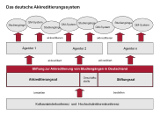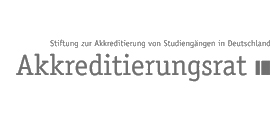Hinweis: Auf dieser Seite finden Sie Informationen zum alten Akkreditierungsrecht bis 31.12.2017.
How the system works
 As the German Accreditation System is organised in a decentralised manner, one of its characteristics is that the accreditation of study programmes ( → programme accreditation) resp. of internal quality assurance systems of higher education institutions (→ system accreditation) is carried out by Accreditation Agencies, who in turn are accredited by the Accreditation Council of the Foundation for the Accreditation of Study Programmes in Germany (→ accreditation of agencies).
As the German Accreditation System is organised in a decentralised manner, one of its characteristics is that the accreditation of study programmes ( → programme accreditation) resp. of internal quality assurance systems of higher education institutions (→ system accreditation) is carried out by Accreditation Agencies, who in turn are accredited by the Accreditation Council of the Foundation for the Accreditation of Study Programmes in Germany (→ accreditation of agencies).
The Accreditation Council – as the central decision-making body of the foundation – defines the basic requirements of the process and takes care that any accreditation is carried out on the basis of reliable, transparent and internationally recognised criteria.
The legal basis of the accreditation system is set out in the Accreditation Foundation Law as well as in the contracts concluded between the Foundation and the agencies and defining the rights and obligations of the partner institutions involved in the accreditation system. As part of their contract agreements, the Agencies commit themselves to the deployment of the resolutions of the Accreditation Council as well as to taking the Common Structural Guidelines of the Länder into consideration, which are the legal basis for the accreditation of study programmes.
